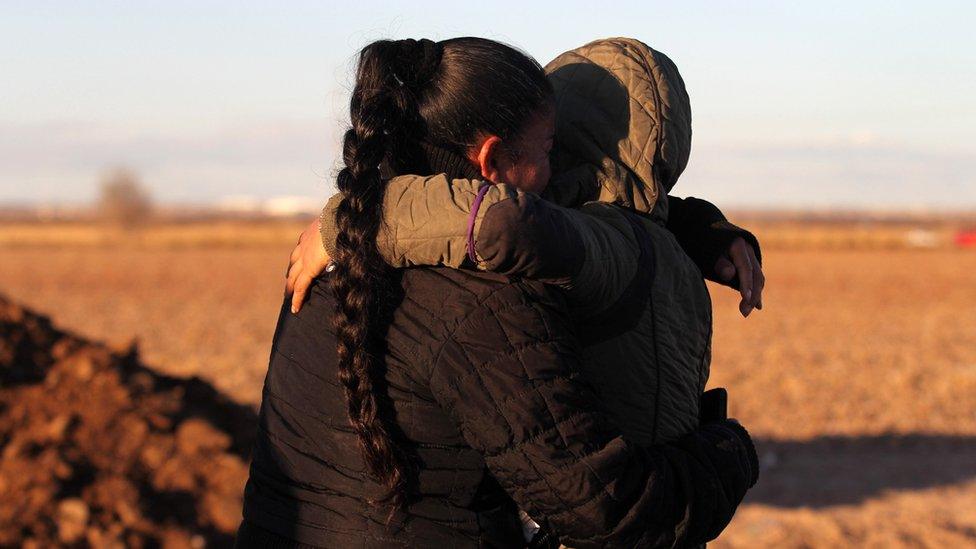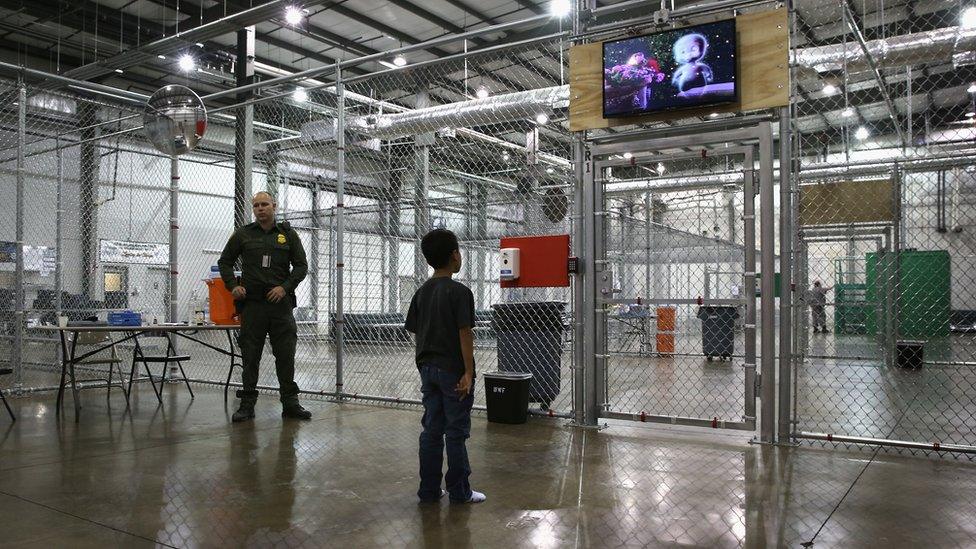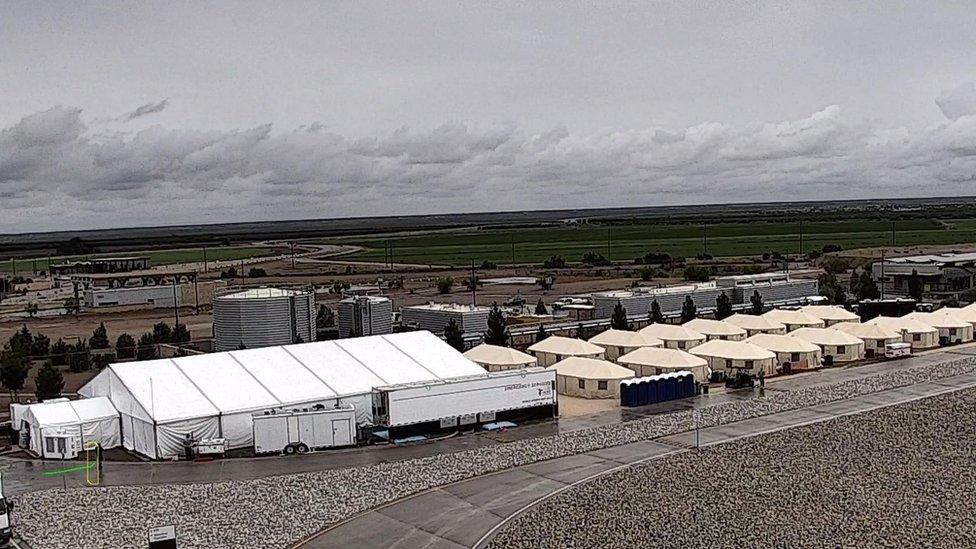The health impact of separating migrant children from parents
- Published
The sound of migrant children separated from parents
Paediatric and child trauma experts are sounding the alarm that separating migrant children from their parents at the US border can cause serious physical and psychological damage.
As more stories emerge about children being separated from their parents at the border between Mexico and the US, doctors and scientists are warning that there could be long-term, irreversible health impacts on children if they're not swiftly reunited.
The head of the American Academy of Pediatrics, external went so far as to call the policy "child abuse" and against "everything we stand for as paediatricians".
"This is completely ridiculous and I'm approaching that not as someone who's taking a position in the politics, but as a scientist," says Charles A Nelson III, a professor of paediatrics and neuroscience at Harvard Medical School.
"We just know the science does not support that this is good for kids."
Migrant boys detained in a former Walmart in Texas
From mid-April to May this year, the US Department of Homeland Security says it has separated nearly 2,000 children from their parents, after the families crossed the border into the US. The adults are being jailed and prosecuted for illegal border crossing under a new "zero-tolerance" policy enacted by the Trump administration, while their children are moved into shelters overseen by the Office of Refugee Resettlement.
May figures from the Department of Health and Human Services show children are being held an average of 57 days, but there have been reports of months-long separations, external and parents deported back across the border, external without knowing where their children are located.
Department of Homeland Security secretary Kirstjen Nielsen told reporters on Monday that the children are well-looked after.
"We have high standards. We give them meals and we give them education and we give them medical care. There are videos, there are TVs," she said.
However, paediatric health care professionals say that just because the children are well-fed and physically safe doesn't address the risk of long-term negative impacts on their immune systems, the development of their brains and even the shape of their personalities.
"The only times we do this is in a child welfare system when the child is in imminent harm," says Chandra Ghosh Ippen, associate director of the Child Trauma Research Program.
"We're causing irreparable harm when it's not necessary."

Short-term impact
Scientists say the moment of separation is all but guaranteed to be traumatic and panic-inducing in both children and parents, which will trigger elevated levels of stress hormones like cortisol and adrenaline, elevated heart and blood pressure, anxiety, and symptoms like headaches and an upset stomach.
Jack P Shonkoff, director of the Harvard University Center on the Developing Child, says it is incorrect to assume that some of the youngest children removed from their parents' care will be too young to remember and therefore relatively unharmed.
"When that stress system stays activated for a significant period of time, it can have a wear and tear effect biologically. The younger you are, the more serious the threat."
The children may eventually stop crying and some of the initial shock will diminish, says Shonkoff, but that's not a reason to believe they are no longer in distress.
"They're not flailing and screaming, [but] underneath in their bodies, their stress system is still highly activated - silently, invisibly," he says.
Ghosh Ippen says that emotionally, some children may be pushed into a state of "traumatic bereavement". Tantrum-like behaviour could be replaced with profound anxiety and depression.
"Everything they know has disappeared. The child is in despair," she says.

A boy from Honduras watches a movie at a detention facility
Long-term impact
The extent of the long-term damage done to children depends on the duration of separation, as well as the ages of the children, say researchers.
"Duration is very important," says Shonkoff. "Forcible separation for a few hours is very traumatic, but if the children are immediately reunited with their mothers and fathers they're going to be OK."
Eventually, Nelson says, highly-activated stress systems will begin to cause wear and tear on the physical structures of the brain.
Nelson is a principal investigator on the Bucharest Early Intervention Project, external, a long-term study of 136 abandoned infants and toddlers who wound up in orphanages in Romania in 2000. Nelson and his colleagues have been following the children for 18 years, and says they have observed very different patterns of brain activity in children who were placed in foster care versus those who stayed in an institution.
"What we see in kids who have been reared in institutions, that is separation from their parents, is a dramatic reduction in the brain's electrical activity," he says. "If they're then removed and put into good homes before the age of two, a lot of this recovers. But if they're older than two, meaning, say, the separation has occurred for two years, there's no recovery. The brain continues to produce dramatically less brain activity."
Over the long term, Nelson also observed that the brains of children who were separated from their parents had a "dramatic reduction in grey matter" and that even when placed in foster care, there was only a small recovery in white matter.
Children may develop long-term psychological conditions like post-traumatic stress disorder and separation anxiety, and run a higher risk of developing heart disease and diabetes later in life. There is also the possibility of behavioural impacts. Nelson says children - boys in particular - may begin exhibiting a "callous indifference" for the feelings of others. They may have difficulties with memory, impulse control and become more prone toward delinquent behaviour.
"The other complexity here is we don't know the kids' histories, so if they're fleeing a country that has a lot of conflict," says Nelson. "If the children have already been exposed to highly levels of trauma-related things, then this is going to be that much worse."

Official images of the tent city for migrant children in Tornillo, Texas, were released on Monday
The broader impact
Ghosh Ippen says that even if we assume all the children will one day be reunited with their parents, there's no telling what the total collateral damage of this policy will be on the children, their parents, their extended families and even on the government workers who have been charged with attending to them.
"This is going to have negative ripple effects for years to come," she says.
Health care professionals are calling for the government to release more information about the kind of mental health care separated children are getting in shelters, but Shonkoff says that in some ways, debating those kinds of interventions is thinking about the problem backwards.
"The answer is, the best intervention by far is to reunite them with their parents," he says.
"[It's as] if children were being fed poison and we asked, 'What's the best treatment for the poison they're getting?' The logical and scientific question is not to come up with the antidote for the poison, it's to stop poisoning them."